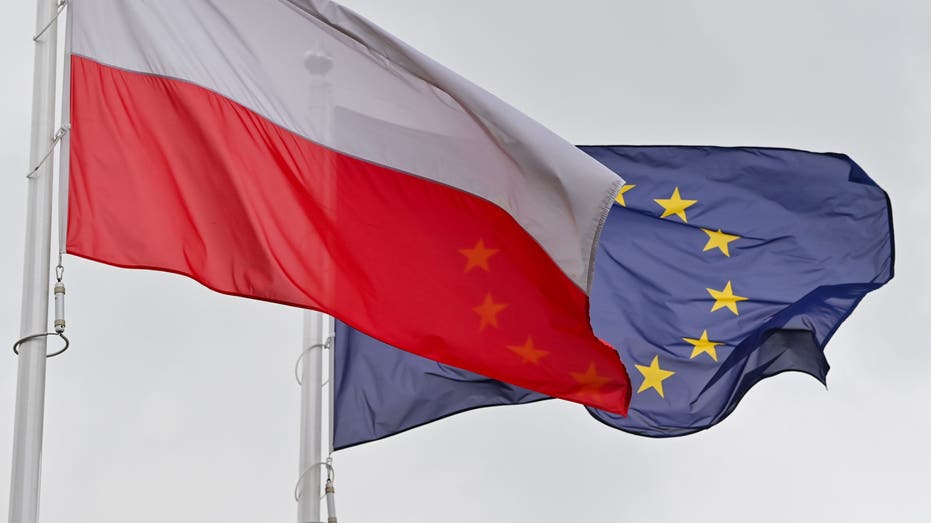Nothing seems to get in the way of Poland going from strength to strength despite being part of the sluggish European Union. There are multiple reasons why and many facets, including the country’s outstanding defense spending and its conservative Donald Trump-like approach to illicit immigration.
Late last month, Poland’s economy was estimated to have grown by 2.9% last year, according to the country’s StatOffice. That performance trounces Europe’s single currency area, also known as the eurozone, by more than threefold; it eked out a mere 0.7% over the same period.
Poland’s growth also overtook the U.S., which grew a robust 2.5% in the 12 months through December.
“The last year or two has seen a boom, and it’s getting publicity,” says Mateusz Urban, a senior economist at Oxford Economics in Warsaw, Poland, told FOX Business. “There really is a European tiger right at Germany’s door.”
GERMANY IN ECONOMIC DOLDRUMS AMID TRUMP TARIFF WAR, CHINA COMPETITION
This isn’t a one-off event. By 2024, Poland’s economy had grown to 11 times as big as in 1986. That considerably outpaces the U.S., which grew its economy to be six times as big over the same period, according to data from Trading Economics.
Urban says a big part of Poland’s fast growth involved unlocking human capital after the collapse of the Soviet Union. During the many decades of USSR rule, the government devoted a lot of effort to educating people in math, science and engineering, and the ongoing impact of those universities and schools is still much appreciated.
“These kinds of institutions have a long-lasting legacy,” Urban said. “After 1989, Poland inherited quite a well-organized system that managed to produce a good number of specialists in mechanical engineering and information technology.”
DREAMS OF ‘UNITED STATES OF EUROPE’ DYING FAST AS EU BACKTRACKS AMID ILLEGAL IMMIGRATION
That focus on science, tech, engineering and math helped the country build an impressive tech sector estimated to be worth $32 billion, or 4.5% of the economy this year, according to the Mordor Intelligence research company.
Polish workers are also “very hardworking, with high standards, and cheaper to employ than people in the United Kingdom,” Elias Haddad, a senior markets strategist at Brown Brothers Harriman in London, told FOX Business.
Another factor Poland is benefiting from is the appointment of EU veteran Donald Tusk as prime minister in December 2023. Previous to him, the Polish Law and Justice Party, led by Mateusz Jakub Morawiecki, had been sanctioned by the European Commission [EC] due to the belief that Poland’s judiciary was not independent of the government.
“The party were not abiding by some of the EU rules,” Haddad says.

The result was the EC held back EU funds meant to help Poland. But now with Tusk firmly in the hot seat, EU money should all be released, giving the economy yet another boost.
While the country is growing fast, it is also on the front line of NATO, the military alliance founded after WWII, bordering Ukraine. The country is expected to spend 4.7% of its GDP on defense this year, which is a larger percentage than any other NATO member, and it led the way in 2024 as well.
“We are aware that Germany won’t be able to rescue Poland,” Urban says. “That’s why the government is pushing spending to near 5% of GDP.”
For decades, Germany failed to reach its NATO commitment of spending at least 2% of GDP on defense, according to the World Bank. In 2024, it reached 2.1%.
While Poland has responded positively to the Ukraine-Russia war during that time, it has also taken on a burden of more than 7 million refugees from Ukraine.
“Since the war, we became an attractive place for immigration and refugees,” Marcin Klucznik, a senior advisor for the world economy team at the Polish Economic Institute, told FOX Business.

However, that massive influx has led to discussions of who Poland wants to attract to its country, Klucznik says. Last month Rafał Trzaskowski, a candidate for Poland’s presidency, requested the government stop paying so-called child benefit subsidies to Ukrainians with children but who aren’t officially working. He has stated that only those working and paying their taxes should get aid from the state.
Klucznik said the country is conservative and cautious with its immigration policy.
“We are aware of some of the mistakes made by other European countries such as Germany, France and the U.K., and we want to avoid some of that,” he said.
In particular, those three large countries have failed to get many immigrants to integrate fully into the local culture.












